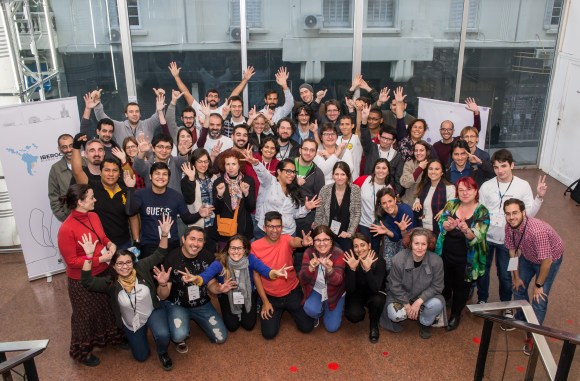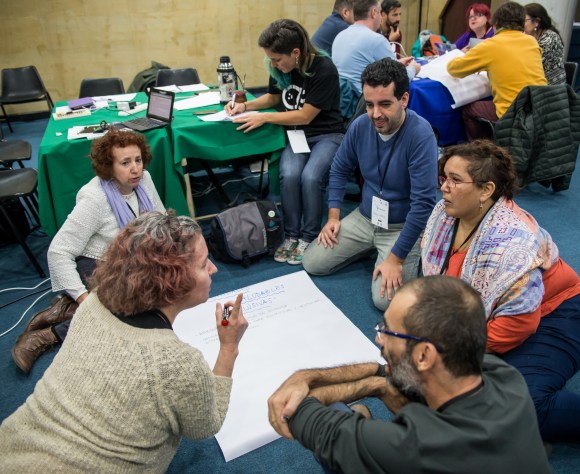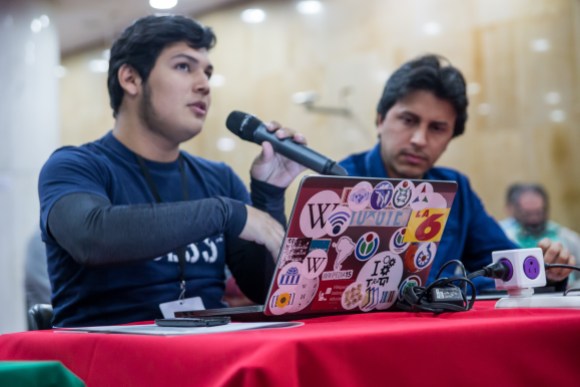
On 10–12 June, Iberoconf 2017 was held in Buenos Aires. The event was—now more than ever before—a space to encounter, meet, and share information with local Iberocoop affiliates, all located in Spanish-, Portuguese-, and Italian-speaking countries in the Americas and Europe. The conference was set up as a space for learning and strategic planning, to better leverage the network’s impact in the movement; as a place to represent local organizations and their communities; and as a space to centralize demands.
Iberocoop has grown a lot in the last three years, and since the last regional meeting in 2014 we have come a long way to be able to hold this year’s meeting. Far from creating quantitative goals related to creating content on different language version Wikipedias, Iberocoop has began establishing long-term goals towards a clear end: to drive better work by local affiliates, so that this can in turn translate into more strategic impact of our network in a regional level. This has been possible because we have shared lessons learned across Iberocoop for the last three years. We have driven, together, dozens of programs, where we created over 7,000 articles. But numbers alone are not representative of our work.
Our challenge was not understanding if we could work together on writing contests and other programs, but rather, to ask ourselves: Do we want to be a program-driven network? Or do we also want to be a mentoring network for our communities, local groups, and for the region?
At Iberoconf 2017, we designed a meeting where the main goal was to acquire relevant knowledge and skills through practice, and applying knowledge together to generate more impact at the regional level.
We carried out this goal through the following shared lessons:
Involving all participants, from the beginning, in the organization of the conference helps to define goals in a more strategic way.
Wikimedia organizations were more than just participants in the conference, playing an active role as counterparts. Through virtual and in-person meetups, and instant message channels like Telegram, we agreed on the current state of the Iberocoop network. Further, we defined the roles and outcomes of the regional meetup in a participatory way, by means of a survey. This allowed us to create a program that was relevant for the needs and demands of the participating organizations.

We designed participatory learning spaces to promote the construction of a support and cooperation network that is stronger and more professionalized.
We avoided session formats like lectures and one-sided presentations. These types of sessions were very present in Iberoconf 2014, and they are usually led by the stronger affiliate groups, which restricts participation from organizations with a different development level. They leave little room for discussion and participation of all groups. For this reason, we promoted hands-on workshops, where working in groups could guarantee a similar learning outcome.

We created broad and flexible debate spaces, some created on the spot during the event, to help ensure concrete outcomes.
We organized a structured conference with flexible slots in its debate spaces. We provided general instructions, so that all participants would feel comfortable, and we granted facilitation of these spaces to an external contractor, to guarantee fair participation for all. These spaces defined their content according to the needs and wishes expressed by members of the network; openness and coordination were key to make this happen. As a result, we managed to achieve concrete outcomes, especially in relation to Iberocoop’s stance in the movement strategy for 2030, and also setting concrete demands in an open letter addressed to the Wikimedia Foundation.
We made the event into a meeting space to empower the local community and invite new participants to join.
Engaging the local community in international events allows for them to have a better understanding of the movement they belong to. The community played a key part in the organization of the event, and they were involved as mentors of the meeting to incorporate newcomers. For the first time, this leading role allowed that representatives of other affiliates, new editors, and local partners could be part of a regional gathering in an active, inclusive and participatory way.
Video by Wikimedia Argentina, CC BY-SA 3.0. If your browser is unable to play the video, please click over to Wikimedia Commons.
Giselle Bordoy, Communications
Anna Torres, Executive Director
Wikimedia Argentina

Can you help us translate this article?
In order for this article to reach as many people as possible we would like your help. Can you translate this article to get the message out?
Start translation